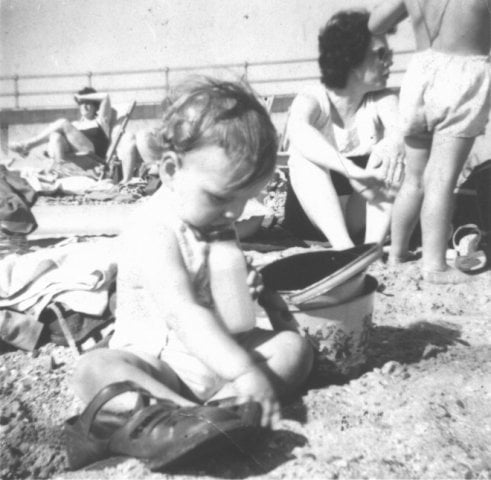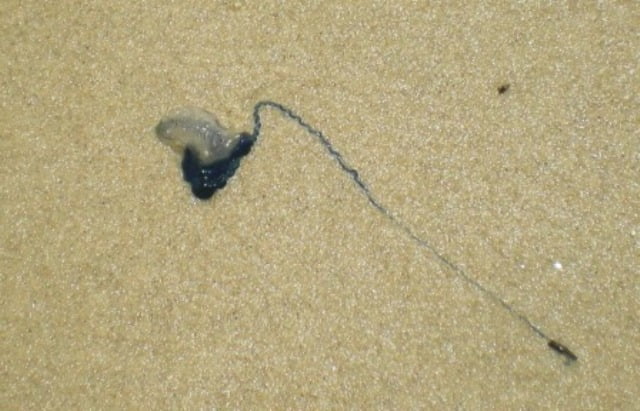Those of you who have read my about me page will know that when I was a kid, I first practiced my surfer dude moves on the beaches of Southend-on-Sea.
 In those days, probably my biggest childhood fear was getting stung by the dreaded jellyfish. Yes, stories of jellyfish lurking in the darkened seas of Southend were common, so I would be constantly surveying the surface area around me looking for tentacled shadows approaching.
In those days, probably my biggest childhood fear was getting stung by the dreaded jellyfish. Yes, stories of jellyfish lurking in the darkened seas of Southend were common, so I would be constantly surveying the surface area around me looking for tentacled shadows approaching.
But the biggest, biggest, biggest fear was reserved for the Portuguese Man-of-War. Nobody was really sure whether these things had reached the beaches of my home town, but just knowing there was a possibility was enough.
But what did seem common knowledge was that one single sting from this beast would lead to instantaneous death! Even to a small child, this seemed pretty final and to be avoided at all costs.
But these days, we know that to have a real good chance of instant death after a jellyfish sting, swim among the Irukandji.
I never did get stung.
Now let’s fast forward hundreds and hundreds of years to today. Every now and then, when I’m visiting a beach somewhere here in sunny Australia, I see a sign like this….
 Or sometimes, when I am walking along the golden sands, I will come across little blue lumps of dead jelly attached to a thin blue line of string. Like these…
Or sometimes, when I am walking along the golden sands, I will come across little blue lumps of dead jelly attached to a thin blue line of string. Like these…

 These are bluebottles. That’s what they’re called here in Australia. Sounds quite cute really, like a character out of The Goon Show. Certainly a lot less frightening than the fearsome sounding Portuguese Man-of-War.
These are bluebottles. That’s what they’re called here in Australia. Sounds quite cute really, like a character out of The Goon Show. Certainly a lot less frightening than the fearsome sounding Portuguese Man-of-War.
Which is exactly what the bluebottle is.
Some Portuguese Man-of-War, or bluebottle, facts:
- So named because it looks like a Portuguese battleship with sails.
- And like a sailing ship, it relies on the wind and tidal movements to get about.
- As such, it has no control on the direction it goes in, which is why many of them end up dead on the beach.
- But don’t ever touch one on the beach, it might not be quite yet dead and could therefore still sting you.
- Its body is an Argon gas filled float and sizes are between 9 to 30 centimetres.
- The stinging tentacles can be up to 50 metres long!
- It’s not a true jellyfish but a siphonophore, a class of marine invertebrate.
- They can travel in gangs, up to a 1,000 in a group. Time to get out of the sea!
- He is responsible for up to 10,000 human stings in Australia each summer.
The sting of a bluebottle.
So, were those childhood rumours true? Can the Portuguese Man-of-War really kill a human?
The sting of the bluebottle does cause a sharp, severe pain and can leave a zigzag blotchy pattern on the skin. Sometimes these stings can bleed which can lead to scarring.
Usually though, the pain subsides within an hour or two. It’s important to remove the tentacles from your skin carefully (without touching them with your fingers) and it helps to bathe the wound in warm salty water. But be warned, this is one sting that is not helped by the application of vinegar. Vinegar can actually increase the toxin delivery.
But as with most stings, it can lead to an allergic reaction which is where some of the more severe problems can be caused. You know shock, fever, heart and lung problems, that sort of thing.
But can it kill?
Yes, there have been deaths. There was a death in Florida back in 1987. But so far there have been no recorded deaths here in Australia. That’s not bad out of up to 10,000 stings each summer.
Turns out the Portuguese Man-of-War likes warm water. So that counts the sea at Southend out then. All that worry for nothing.
But Bondi Beach has warm water!
Last week we had a lot of fun over at Bondi Beach. This week we take a look at people who didn’t have very much fun at all there…..
So the bluebottle, or Portuguese Man-of-War, is very definitely another of Australia’s bad things.
Update May 2013:
I stand corrected, the bluebottle has claimed a life here in Australia, check out Brooke’s comment below.






Jellyfish are pretty much the only things which truly petrify me (luckily the kind of wildlife conservation I’m interested in is on solid or nearly solid ground)
You say there are still chances where ‘dead’ blueys could still be alive and sting, I thought all jellies can still sting dead or alive, or was it my brother torturing me again lol xD
Speaking of brothers, my mom always tells this story of when my bro was about 4 (a year before I was born) they were on holiday in Oz, and when they were spending some time on the beach my brother picked up a jelly and asked what it was to my parents. This jelly happened to be a bluey (or box jelly… can’t quite remember) Obviously my parents freaked and told him to drop it immediately, luckily he was holding it by the bell so no nasty sting for him haha
Leon
I don’t think a dead jellyfish could sting you, but I wouldn’t pick one up anyway, just in case.
Lucky your brother didn’t drop it on his foot. Hehe.
Hi just to let you know that there has been a case in australia of someone dieing after receiving a sting from Portuguese Man O’ War. my grandfathers cousin David William Taylor was killed on 20th Jan 1937 after the tentacles from a Portuguese Man o’war wrapped around his chest or abdomen he was unfortunately dead within approximately 10 minutes, he was swimming on a beach in Cairns. I have a copy of the police report and http://trove.nla.gov.au/ndp/del/article/94617316?searchTerm=david%20william%20taylor&searchLimits=. I believe it caused a cardiac arrest. Cheers Brooke
Hi Brooke
Between me and Google we know everything, but this subject was one of Google’s specialities, seems like they messed up. Thanks for correcting me, I have now added an update to the above post, clearly a life has been claimed by the bluebottle here in Australia.
Definitely worth staying out of the sea when these things are around, that’s for sure. Cheers, Bob